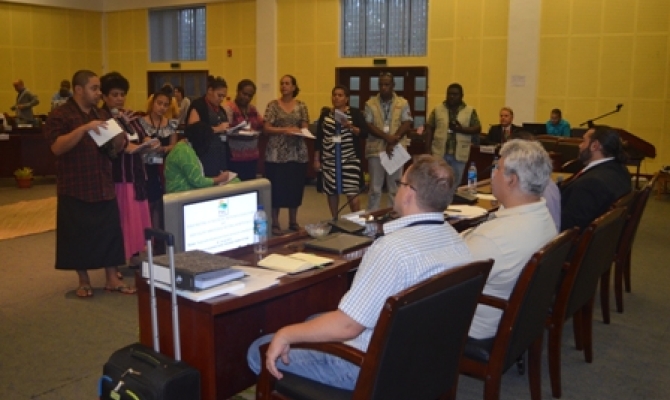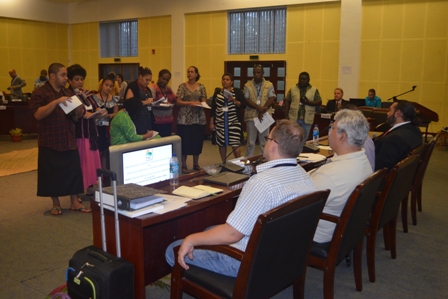
Climate Change Resilience
By Duane Mar of USP Journalism School and paper Wansolwara
23 July, 2015, Nuku’alofa, Tonga, PMC-3 – Effortsby the Secretariat of the Pacific Regional Environment Program in training media on meteorological services were recognised by the Pacific Meteorological Council, according to PMC Chairman Ofa Fa'anunu.
Speaking at the Third Pacific Meteorological press panel at the conclusion of day three, Fa'anunu said that the coverage of this year's meet by media has been excellent.

Pacific Media Team reporting on the Third Pacific Meteorological Council
"This coverage of this meeting may be three times better than the last PMC, and you're getting stories from every single met-service, which I think is great as we have a range of expertise here," he said.
Fa'anunu said that readers are getting a broad range of issues covered this year and realise what met-services are doing to address issues.
"Our readers are getting the big picture of the diversity in the PMC, as well as the challenges we face. Having the media report this is good for accountability and visibility," he said.
"Our nations see what is happening here and the decisions being made and they know what the met-services are doing in order to advance meteorology in the region," he said.
USP Journalism's Duane Mar later caught up with the media team's coordinator Nanette Woonton, who said that the work been done by SPREP is achieving results.
"I think it shows that the work we've been doing since 2008 is reaching fruition. In the past we’ve covered a broad range of environment issues and now we are expanding this focus to include Met services," she said.
Woonton, said that the results from the media training program were being shown in the level of understanding by those reporting on the PMC issues.
"One of the things that I've noticed between this PMC and the last is that journalists are actually following the discussions around the table. Last time we didn't have training for the event and so everyone was brought in cold," she said.
Woonton said she was very appreciative of the recognition the media received by the PMC leaders.
"I think it's awesome that the met directors clapped for the journalists. It's been a lot of hard work, and this makes it all worth it," she said.
However she said that this was not the end as more work needed to be done for the program.
"Just because we've had this doesn't mean it's over, it's ongoing. We’ve seen a lot of improvement, but we still need more work together for it to continue to evolve," she said.
Woonton said journalists are now doing more personal stories on the PMC-3 and this was a good thing.
"There are a lot of science and technical aspects to meteorology, but there are a lot of human aspect and I think it would help break it down for people if they see that met staff are human's with lives and families and part of communities," she said.
Woonton said that was looking forward to the first ever Ministerial Meeting component attached to the PMC-3.
"I think it will be really good to hear about the commitments by the different governments and the ministers towards supporting the enhancement, or building capacity towards met staff," she said.
The PMC-3 will reach its conclusion on Day 4, 23rd July and will go back-to-back with the Ministerial Meeting on Friday 24th - #PacMC2015
Mr. Duane Mar is a journalism student of the University of the South Pacific, he writes for the Journalism paper – Wansolwara – www.wansolwara.com
Mr. Duane Mar is a journalism student of the University of the South Pacific, he writes for the Journalism paper – Wansolwara – www.wansolwara.com
This article was developed by a Pacific Media Team of Reporters currently providing coverage on the Third Pacific Meteorological Council in Tonga. This activity coordinated by SPREP is supported by a partnership including the Government of Tonga, SPREP, Finland Ministry of Foreign Affairs, Finnish Meteorological Institute (FMI), World Meteorological Organization (WMO) and the Pacific Media Assistance Scheme (PACMAS).